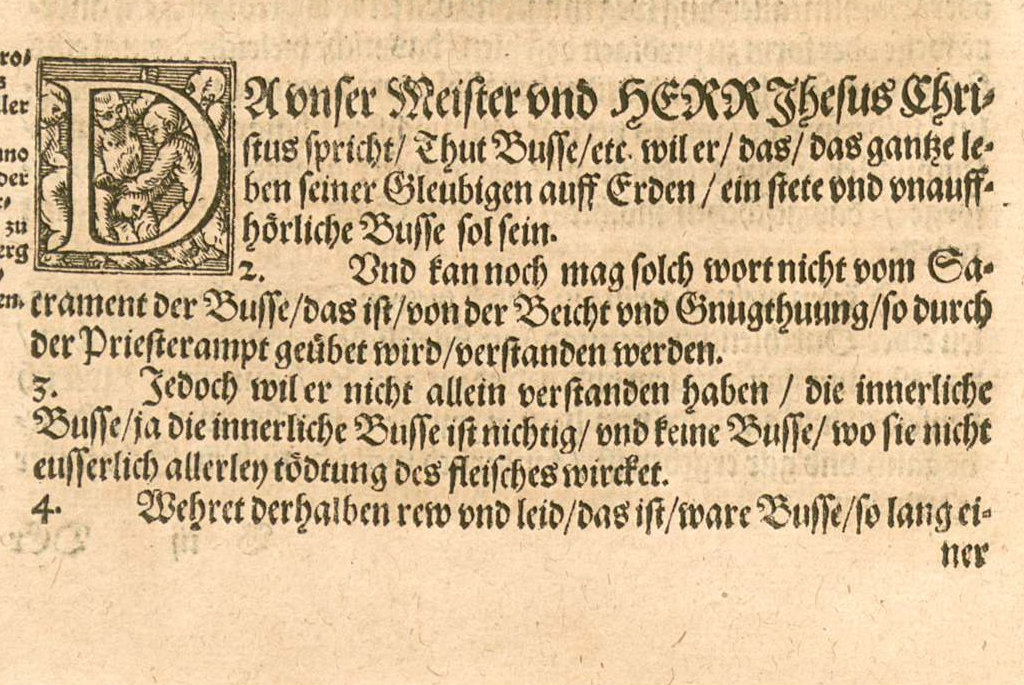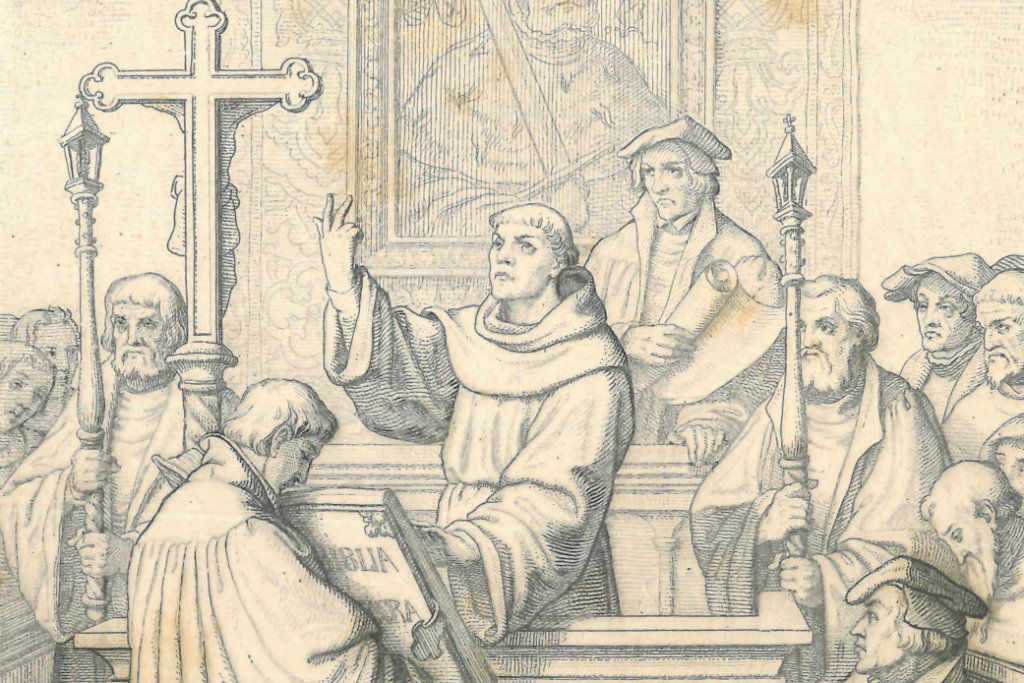![95 Theses Luther's 95 Theses. c. 1557 [Public domain], via Wikimedia Commons](https://blogs.lcms.org/wp-content/uploads/2017/10/95_Thesen_Erste_Seite_banner-1.jpg)
by Kevin Armbrust
October 2017 marks the 500th anniversary of the Lutheran Reformation. Yet it is not the anniversary of any great statement Luther made as a reformer or in front of any court. There was no fiery and resounding speech given or dramatic showdown with the pope. On October 31, 1517, Martin Luther posted the “Disputation on the Power and Efficacy of Indulgences” to the church door in a small city called Wittenberg, Germany. This rather mundane academic document contained 95 theses for debate. Luther was a professor of theology at the University of Wittenberg, and he was permitted to call for public theological debate to discuss ideas and interpretations as he desired.
Yet this debate was not merely academic for Luther. According to a letter he wrote to the Archbishop of Mainz explaining the posting of the 95 Theses, Luther also desired to debate the concerns in the Theses for the sake of conscience.
Luther’s short preface explains:
“Out of love and zeal for truth and the desire to bring it to light, the following theses will be publicly discussed at Wittenberg under the chairmanship of the reverend father Martin Luther, Master of Arts and Sacred Theology and regularly appointed Lecturer on these subjects at that place. He requests that those who cannot be present to debate orally with us will do so by letter.”
The original text of the 95 Theses was written in Latin, since that was the academic language of Luther’s day. Luther’s theses were quickly translated into German, published in pamphlet form and spread throughout Germany.
Though English translations are readily available, many have found the 95 Theses difficult to read and comprehend. The short primer that follows may assist to highlight some of the theses and concepts Luther wished to explore.
Repentance and forgiveness dominate the content of the Theses. Since the question for Luther was the effectiveness of indulgences, he drove the discussion to the consideration of repentance and forgiveness in Christ. The first three theses address this:
1. When our Lord and Master Jesus Christ said, “Repent” [MATT. 4:17], he willed the entire life of believers to be one of repentance.
2. This word cannot be understood as referring to the sacrament of penance, that is, confession and satisfaction, as administered by the clergy.
3. Yet it does not mean solely inner repentance; such inner repentance is worthless unless it produces various outward mortifications of the flesh.
The pope and the Church cannot cause true repentance in a Christian and cannot forgive the sins of one who is guilty before Christ. The pope can only forgive that which Christ forgives. True repentance and eternal forgiveness come from Christ alone.
Luther identifies indulgences as a doctrine invented by man, since there is no scriptural promise or command for indulgences. Although Luther stops short of entirely condemning indulgences in the Theses, he nonetheless argues that the sale of indulgences and the trust in indulgences for salvation condemns both those who teach such notions and those who trust in them.
27. They preach only human doctrines who say that as soon as the money clinks into the money chest, the soul flies out of purgatory.
28. Those who believe that they can be certain of their salvation because they have indulgence letters will be eternally damned, together with their teachers.
God’s grace comes not through indulgences but through Christ. All Christians receive the blessings of God apart from indulgence letters.
36. Any truly repentant Christian has a right to full remission of penalty and guilt, even without indulgence letters.
37. Any true Christian, whether living or dead, participates in all the blessings of Christ and the church; and this is granted him by God, even without indulgence letters.
If Christians are going to spend money on something other than supporting their families, they should take care of the poor instead of buying indulgences.
43. Christians are to be taught that he who gives to the poor or lends to the needy does a better deed than he who buys indulgences.
The second half of the 95 Theses concentrates on the preaching of the true Word of the Gospel. Luther states that the teaching of indulgences should be lessened so that there might be more time for the proclamation of the true Gospel.
62. The true treasure of the church is the most holy gospel of the glory and grace of God.
63. But this treasure is naturally most odious, for it makes the first to be last [MATT. 20:16].
The Gospel of Christ is the true power for salvation (ROM. 1:16), not indulgences or even the power of the papal office.
76. We say on the contrary that papal indulgences cannot remove the very least of venial sins as far as guilt is concerned.
77. To say that even St. Peter, if he were now pope, could not grant greater graces is blasphemy against St. Peter and the pope.
78. We say on the contrary that even the present pope, or any pope whatsoever, has greater graces at his disposal, that is, the gospel, spiritual powers, gifts of healing, etc., as it is written in I Cor. 12[:28].
Preaching a false hope is really no hope at all. As a matter of fact, a false hope destroys and kills because it moves people away from Christ, where true salvation is found. The Gospel is found in Christ alone, which includes a cross and tribulations both large and small.
92. Away then with all those prophets who say to the people of Christ, “Peace, peace,” and there is no peace! [JER. 6:14].
93. Blessed be all those prophets who say to the people of Christ, “Cross, cross,” and there is no cross!
94. Christians should be exhorted to be diligent in following Christ, their head, through penalties, death, and hell;
95. And thus be confident of entering into heaven through many tribulations rather than through the false security of peace [ACTS 14:22].
Throughout the 95 Theses, Luther seeks to balance the role of the Church with the truth of the Gospel. Even as he desired to support the pope and his role in the Church, the false teaching of indulgences and the pope’s unwillingness to freely forgive the sins of all repentant Christians compelled him to speak up against these abuses.
Luther’s pastoral desire for all to trust in Christ alone for salvation drove him to post the 95 Theses. This same faith and hope sparked the Reformation that followed.
Dr. Kevin Armbrust is manager of editorial services for LCMS Communications.






urls for
1. the Latin original 95 theses
ccel.org ccel luther theses theses.iii
2. an English translation
ccel.org ccel luther theses theses.ii
3. a Modern German translation of the Latin
ekd.de/95-Thesen-10864
[It’s regrettable that, as I understand it, no German translations contemporary with Luther have survived, which seems incredible, but since truth is strange, stranger than fiction, maybe possibly true!]
Thx. This article does clear up a number of difficulties in interpreting the drift & theme of the 95 thesis. The fact that he supports the pope’s office at this juncture is new to me.
Very useful as I prepare a Sunday School lesson. Thanks
As important as the 95 Theses were for the beginning of the Reformation, and since they are not specifically part of the Lutheran Confessions, are there any of the Theses that we Lutherans consider unimportant or would rather avoid, theologically speaking?
I wish Luther was here, maybe things would change in our country and bring more folks to Jesus .
“When our Lord and master Jesus Christ says, ‘Repent,’ he wills that the entire life of the Christian be one of repentance.”
This seemingly joyless statement is often quoted, less often explained, and easily misunderstood. Is Jesus calling for the main theme of Christian life to be, “I’m ashamed of my sin”?
The full sentence from Matthew 4:17 is, “Repent, for the kingdom of heaven is at hand,” spoken when Jesus was beginning His ministry. This layman might paraphrase those words as, “Change your mindset, for divine authority is coming among you.” Indeed, when a very important person is coming to visit, we depart from business as usual, adjust our priorities, focus on careful preparation, and behave as befits the status of the visitor.
The word “repent” is recorded in Greek as “metanoeite”, which I understand to be not about remorse — not primarily about feelings at all — but about changing one’s mind or purpose.
The Christian life has a variety of themes, of which repentance is one. But repentance is not an end in itself. It is pivoting and changing course to pursue a direction that better fulfills God’s purposes as He gives the grace. For Jesus also willed “that you bear much fruit” (John 15:8) and “that your joy may be full” (John 15:11).
Could you explain number 93? I need this one explained.
Jackie
Agreed. 93 is confusing.
In contrast to the false security of indulgences referenced in 92, number 93 references the preaching of true repentance. With true contrition and repentance over our sins, we Christians humble ourselves to the truth that we have earned our place on the cross as punishment and condemnation. But then we find the eternal surprise and wellspring of joy that our cross has been taken away from us and made Christ’s own. In exchange He gives us forgiveness, life and salvation!
Thank you, James Athey.
I myself did not fully understand this thesis yesterday, when I searched the Internet for an explanation of it. I found that I was not the only person who was confused by it. I also found that Luther explained it in a letter that he wrote to an Augustinian prior in 1516. Here is his explanation:
You are seeking and craving for peace, but in the wrong order. For you are seeking it as the world giveth, not as Christ giveth. Know you not that God is “wonderful among His saints,” for this reason, that He establishes His peace in the midst of no peace, that is, of all temptations and afflictions. It is said “Thou shalt dwell in the midst of thine enemies.” The man who possesses peace is not the man whom no one disturbs—that is the peace of the world; he is the man whom all men and all things disturb, but who bears all patiently, and with joy. You are saying with Israel, “Peace, peace,” and there is no peace. Learn to say rather with Christ: “The Cross, the Cross,” and there is no Cross. For the Cross at once ceases to be the Cross as soon as you have joyfully exclaimed, in the language of the hymn,
Blessed Cross, above all other,
One and only noble tree.
It is posted here: http://www.ccel.org/ccel/luther/first_prin.iii.i.html
Magnificent!